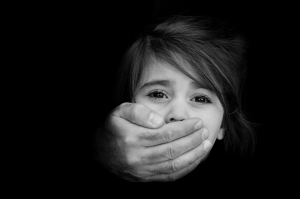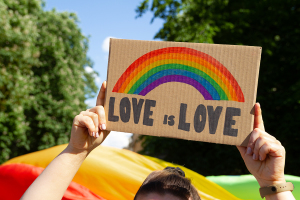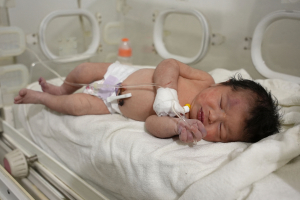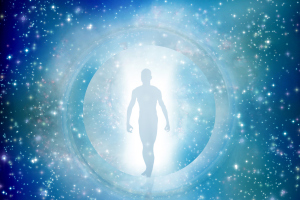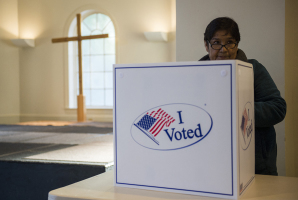Mainline Protestantism vs. Christian Nationalism
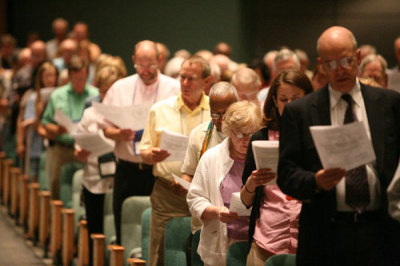
Climate activist Bill McKibben, in an article for The New Yorker, commends Mainline Protestantism as an antidote for Christian Nationalism. He doesn’t realize that the demographic and spiritual collapse of Mainline Protestantism is partly responsible for the rise of Christian Nationalism.
Noting that the religiously unaffiliated are fast growing but largely unorganized, McKibben asks: “Who, then, might take a lead in preventing religion from further encroaching on government?” The answer:
The mainline Protestants who, in the 1960s, made up more than half of Americans don’t have anything like that kind of influence now, but they haven’t disappeared. According to the P.R.R.I.’s religion census for 2020, white mainline Protestants still make up about 16% of the population, and their numbers have grown very slightly in recent years, including among younger Americans. That’s closing in on fifty million people in this country.
This claim that Mainline Protestantism is growing is not substantiated by any hard data. The poll, by a liberal advocacy group, PRRI, identified any Protestant who was not “evangelical” or “born again” as therefore Mainline Protestant. McKibben oddly cites PRRI’s 2020 poll, showing 16% of Americans are Mainline Protestant. But PRRI’s 2022 poll shows that number dropping to 13.9%.
PRRI’s poll essentially labels any Protestant not wanting to identify as “evangelical,” which has become a political label, as Mainline Protestant. But actual membership numbers for Mainline Protestant denominations are devastating. The latest data for United Methodism, the largest Mainline church, shows it dropping for the first time in over 100 years below 6 million. It had eleven million in the 1960s. Other Mainline denominations are faring even worse. The Presbyterian Church (USA) membership, which had over 3 million members 40 years ago, just dropped to 1.1 million. Sixty years ago, one of every six Americans belonged to a Mainline Protestant denomination. Today it is about one for every 25.
But McKibben celebrates that Mainline Protestants, even if their laity “tilt Republican,” have “leadership — their clergy, their seminarians” who are “more progressive,” which is undoubtedly true. He cites the Presbyterian Church (U.S.A.) having adopted resolutions “favoring restorative justice, opposing Israel’s occupation of Palestinian lands, supporting ‘just globalization,’ and calling racism a public-health issue.” But he admits “we no longer live in an era when the mainline churches have enough power to make such resolutions more than words on paper; I served for some years on my Methodist conference’s Board of Church and Society, and I’m afraid that we sometimes referred to ourselves as Bored with Church and Society.”
Yet McKibben thinks “these mainline leaders do have unique credibility for a different task: taking on Christian nationalism from a Christian perspective.” After all, “many mainline leaders value consensus and avoid conflict, often knowing that the people in the pews are more moderate than they are, but they’d be particularly likely to do so in interreligious disputes.”
McKibben’s dream of Mainline Protestantism as antidote to Christian Nationalism is a delusion. He cites Mainline progressive policy positions and progressive activists who have no appeal to millions of conservative Christians, whom he labels as Christian Nationalists. These progressive Mainline activists themselves practice a strident, polarizing, moralistic politics no better than what he condemns.
And as McKibben grants, Mainline elites do not speak for their shrinking but still relatively more conservative constituency. Denominational agencies and activists often are very political, but, as he notes, most Mainline clergy avoid contentious issues with their divided congregations.
Where McKibben is partly right is that Mainline Protestantism for much of America’s history, when still culturally and demographically paramount, did create national cohesion. It affirmed American democracy, having helped make it. It created consensus for social reform. It mediated social divisions. It had confidence and historical patience. It was comprised of national denominations that transcended regional and many political differences.
Mainline Protestantism and its antecedents created American civil religion. It was an inclusive Protestant glue that undergird America’s self-understanding. It provided the language for presidential inaugurations, state funerals, inscriptions on monuments, and momentous speeches like the Gettysburg Address and FDR’s D-Day Prayer. American civil religion was broadly biblical but sufficiently generic to absorb Catholics, Jews, and others fairly seamlessly. It kept religion in public life without strict confessional obligations.
Until the 1960s, Mainline Protestantism offered the ballast for American civil religion. But its radicalization, increasing hostility to the American experiment, estrangement between leaders and members, and membership collapse sidelined it. Absent the cohesion that Mainline Protestantism offered, America became spiritually polarized. Nominal Christians became religious “nones.” Confessionally devout church goers and cultural conservatives became what McKibben derides as “Christian Nationalists.”
Most whom McKibben derides “Christian Nationalists,” whom he estimates as perhaps one third of America, are actually just social and religious conservatives who want to keep traditional religion in public life. They mostly want what Mainline Protestantism long assumed: a broadly Christian America that is fair and welcoming to all. But they no longer have the institutions, historical tools, and corporate restraint to express their desires. So instead, there is often harsh and combative rhetoric. Only a small minority want, if only in theory, a confessional state legally privileging Christians over others.
Once great Mainline Protestantism has mostly died, primarily by its own hand. There are no obvious religious institutions to replace it as a force for national cohesion. New mediating communities will have to arise. But they can only do so if the cause for their need is rightly understood. America does not want or need an officially established religion. But America does need mature and authoritative religious voices who seek the common good for all.
Originally published at Juicy Ecumenism.
Mark Tooley became president of the Institute on Religion and Democracy (IRD) in 2009. He joined IRD in 1994 to found its United Methodist committee (UMAction). He is also editor of IRD’s foreign policy and national security journal, Providence.
















